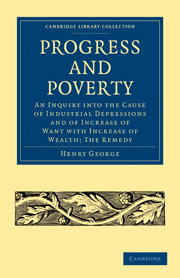 Progress and Poverty
Progress and Poverty Book contents
- Frontmatter
- PREFACE TO FOURTH EDITION
- Contents
- INTRODUCTORY
- BOOK I WAGES AND CAPITAL
- BOOK II POPULATION AND SUBSISTENCE
- BOOK III THE LAWS OF DISTRIBUTION
- Chapter I The inquiry narrowed to the laws of distribution—necessary relation of these laws
- Chapter II Rent and the law of rent
- Chapter III Interest and the cause of interest
- Chapter IV Of spurious capital and of profits often mistaken for interest
- Chapter V The law of interest
- Chapter VI Wages and the law of wages
- Chapter VII Correlation and co-ordination of these laws
- Chapter VIII The statics of the problem thus explained
- BOOK IV EFFECT OF MATERIAL PROGRESS UPON THE DISTRIBUTION OF WEALTH
- BOOK V THE PROBLEM SOLVED
- BOOK VI THE REMEDY
- BOOK VII JUSTICE OF THE REMEDY
- BOOK VIII APPLICATION OF THE REMEDY
- BOOK IX EFFECTS OF THE REMEDY
- BOOK X THE LAW OF HUMAN PROGRESS
- CONCLUSION
- INDEX
Chapter V - The law of interest
Published online by Cambridge University Press: 07 September 2011
- Frontmatter
- PREFACE TO FOURTH EDITION
- Contents
- INTRODUCTORY
- BOOK I WAGES AND CAPITAL
- BOOK II POPULATION AND SUBSISTENCE
- BOOK III THE LAWS OF DISTRIBUTION
- Chapter I The inquiry narrowed to the laws of distribution—necessary relation of these laws
- Chapter II Rent and the law of rent
- Chapter III Interest and the cause of interest
- Chapter IV Of spurious capital and of profits often mistaken for interest
- Chapter V The law of interest
- Chapter VI Wages and the law of wages
- Chapter VII Correlation and co-ordination of these laws
- Chapter VIII The statics of the problem thus explained
- BOOK IV EFFECT OF MATERIAL PROGRESS UPON THE DISTRIBUTION OF WEALTH
- BOOK V THE PROBLEM SOLVED
- BOOK VI THE REMEDY
- BOOK VII JUSTICE OF THE REMEDY
- BOOK VIII APPLICATION OF THE REMEDY
- BOOK IX EFFECTS OF THE REMEDY
- BOOK X THE LAW OF HUMAN PROGRESS
- CONCLUSION
- INDEX
Summary
Let us turn now to the law of interest, keeping in mind two things to which attention has heretofore been called—viz:
First—That it is not capital which employs labor, but labor which employs capital.
Second—That capital is not a fixed quantity, but can always be increased or decreased, (1) by the greater or less application of labor to the production of capital, and (2) by the conversion of wealth into capital, or capital into wealth, for capital being but wealth applied in a certain way, wealth is the larger and inclusive term.
It is manifest that under conditions of freedom the maximum that can be given for the use of capital will be the increase it will bring, and the minimum or zero will be the replacement of capital; for above the one point the borrowing of capital would involve a loss, and below the other, capital could not be maintained.
Observe, again, it is not, as is carelessly stated by some writers, the increased efficiency given to labor by the adaption of capital to any special form or use which fixes this maximum, but the average power of increase which belongs to capital generally. The power of applying itself in advantageous forms is a power of labor, which capital as captal cannot claim nor share.
- Type
- Chapter
- Information
- Progress and PovertyAn Inquiry into the Cause of Industrial Depressions and of Increase of Want with Increase of Wealth; The Remedy, pp. 176 - 183Publisher: Cambridge University PressPrint publication year: 2009First published in: 1881


